Memoir of John Shakespear Bartley, 1916-1919 - Part 19
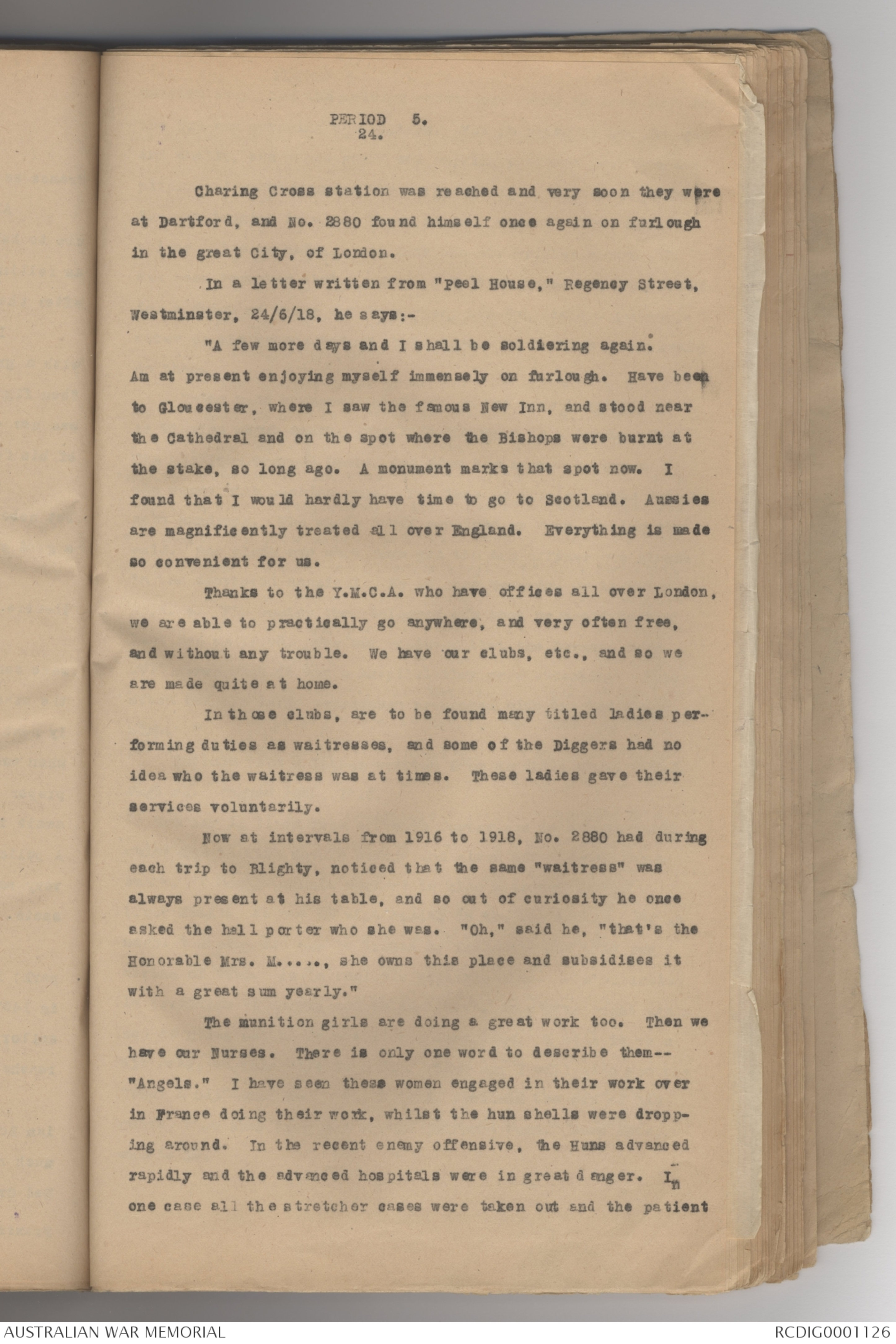
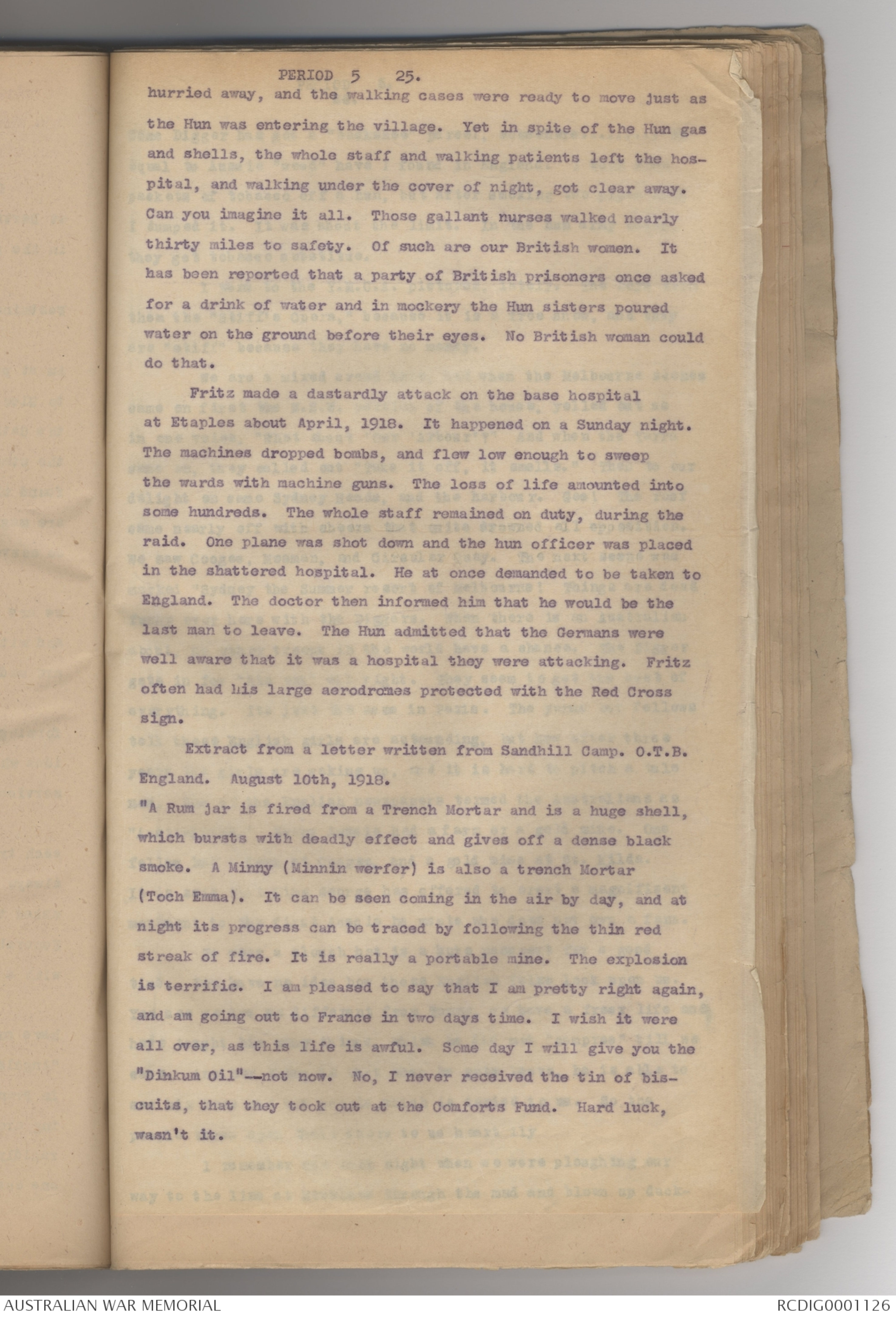
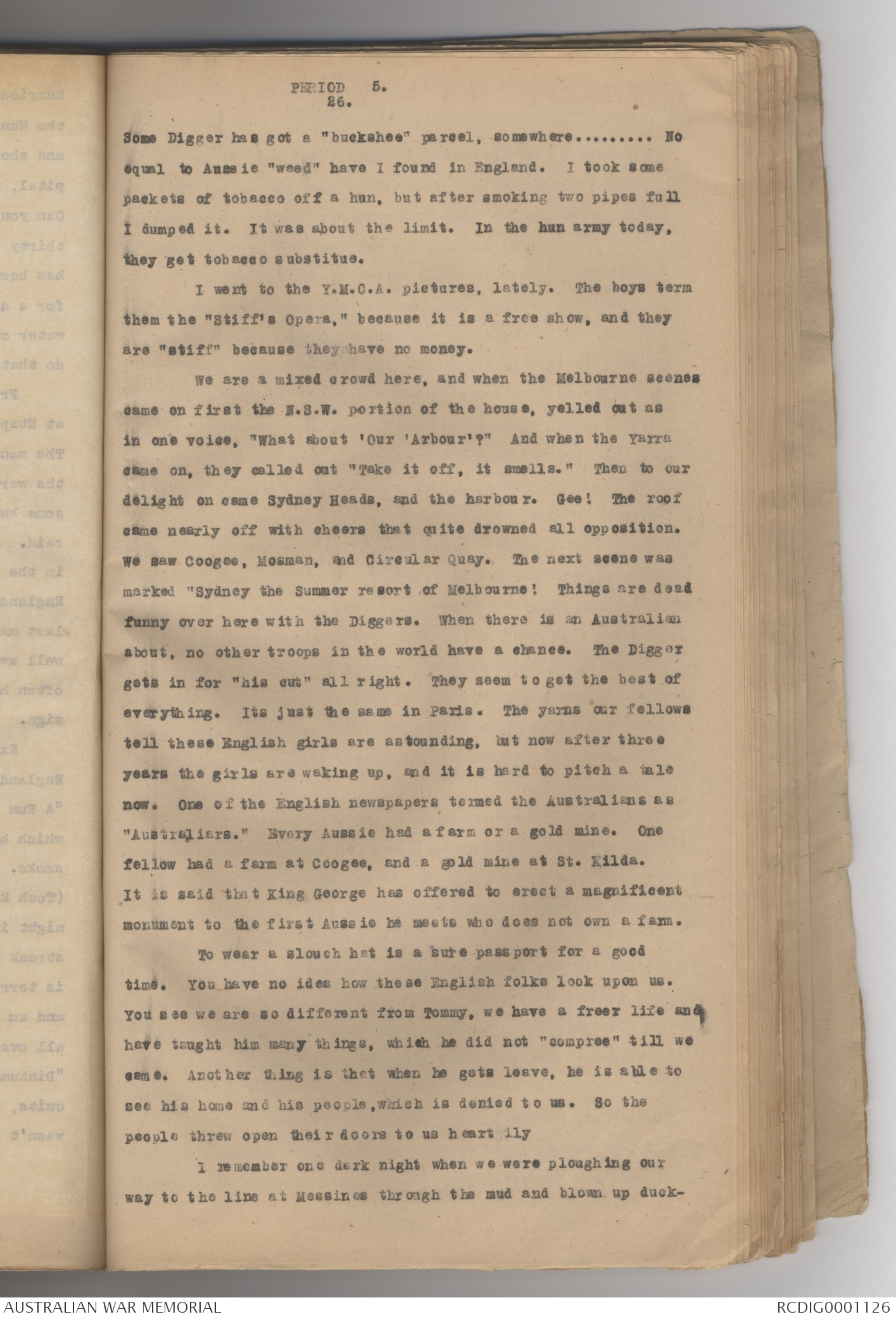
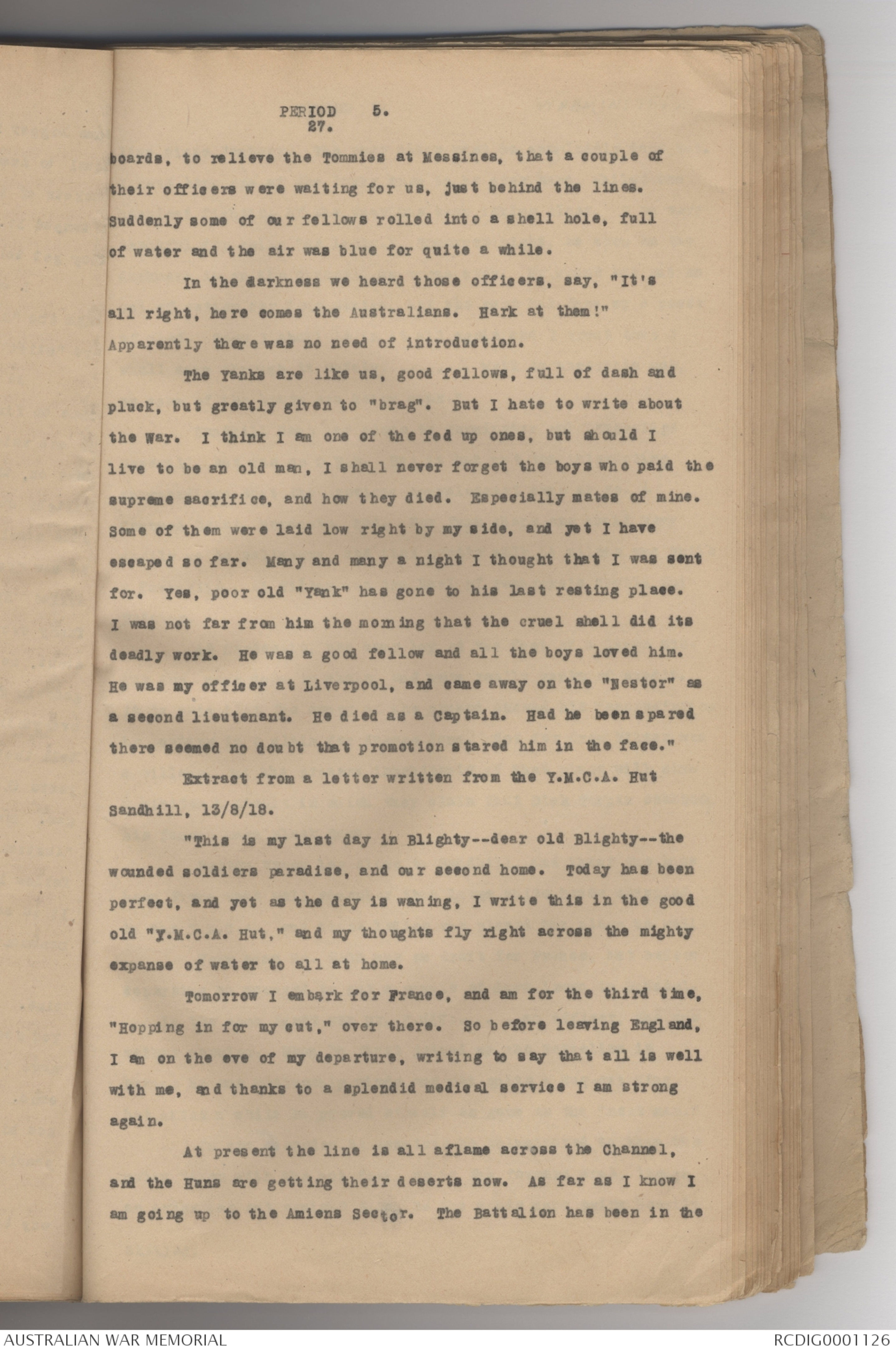
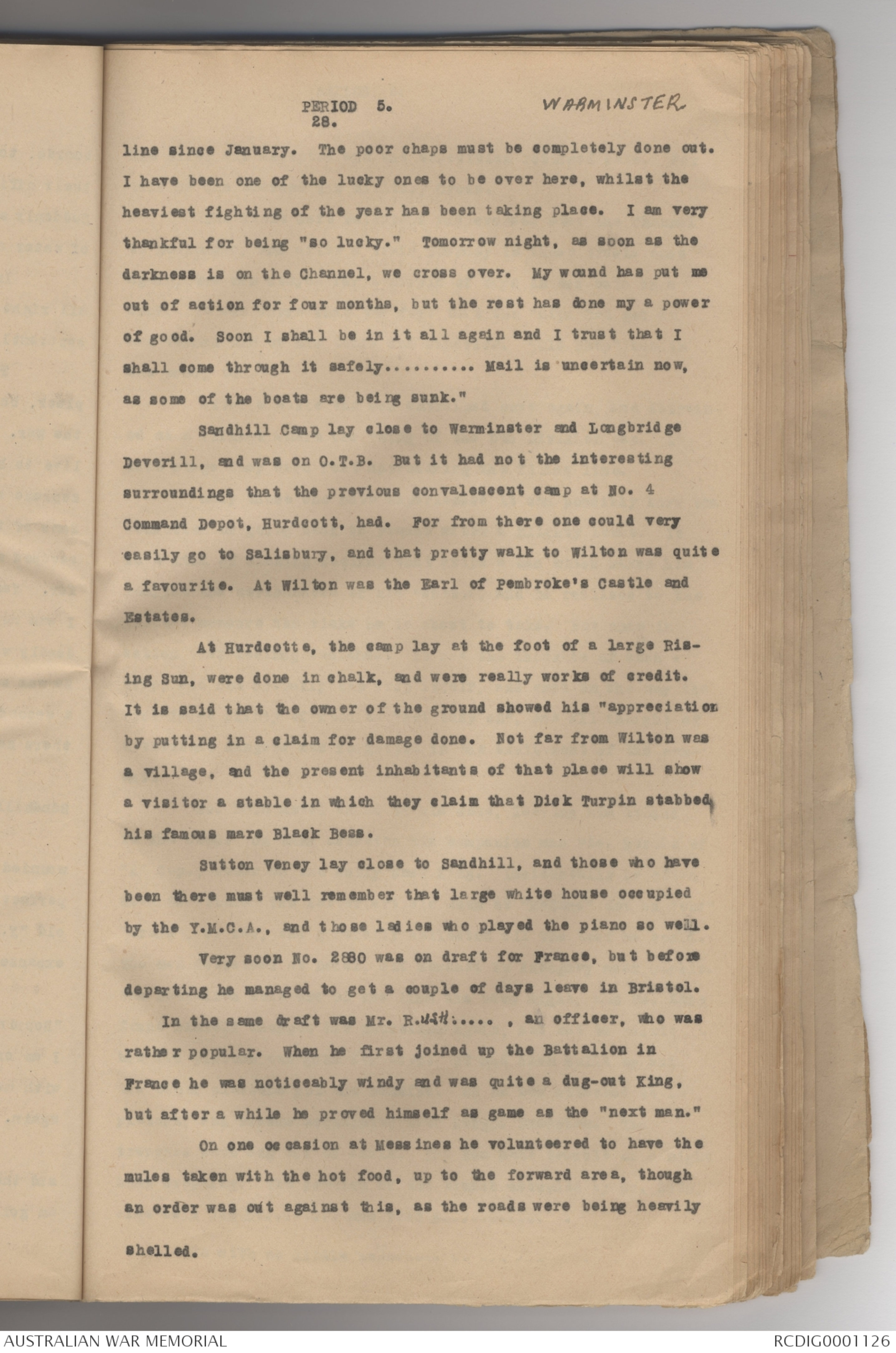
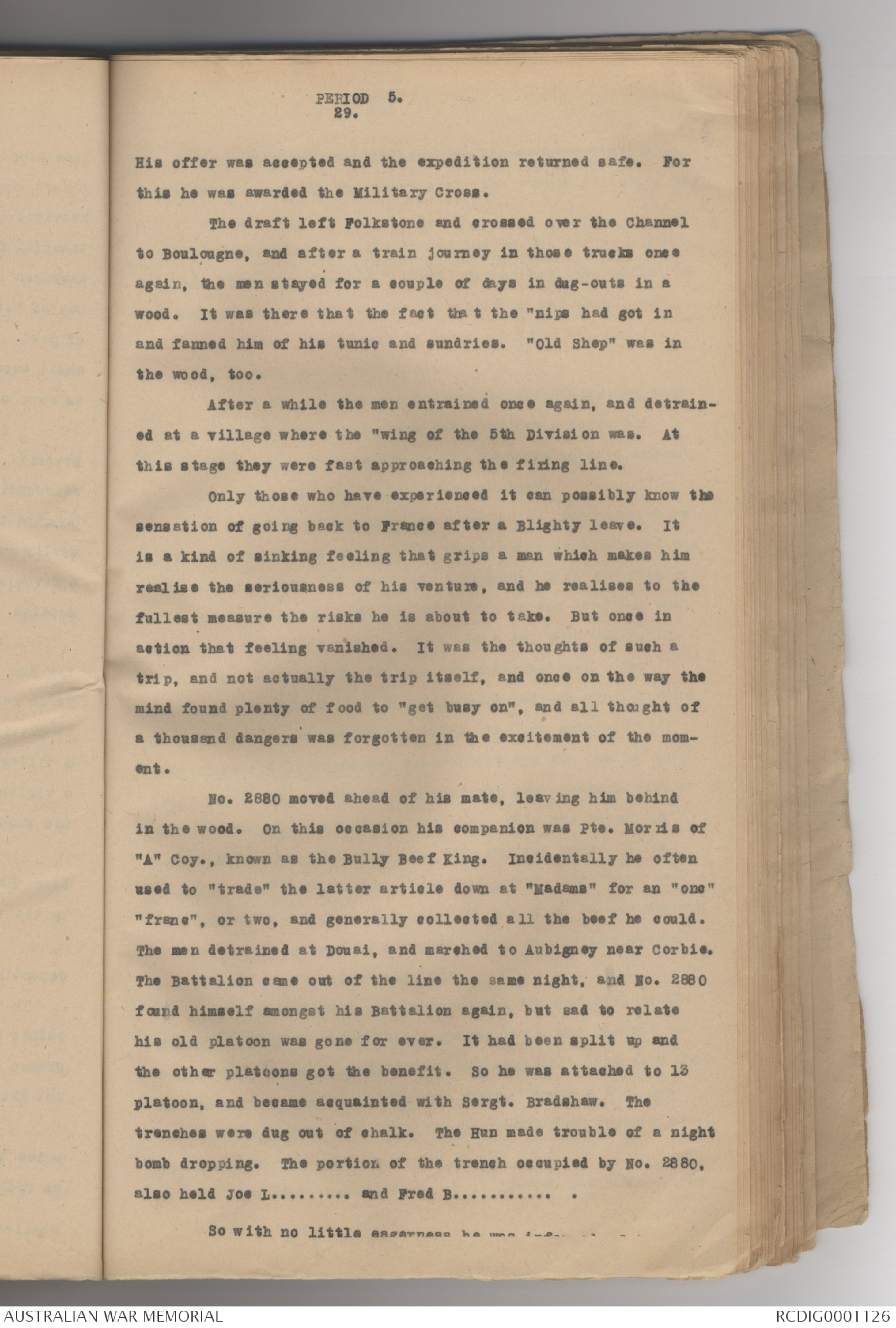
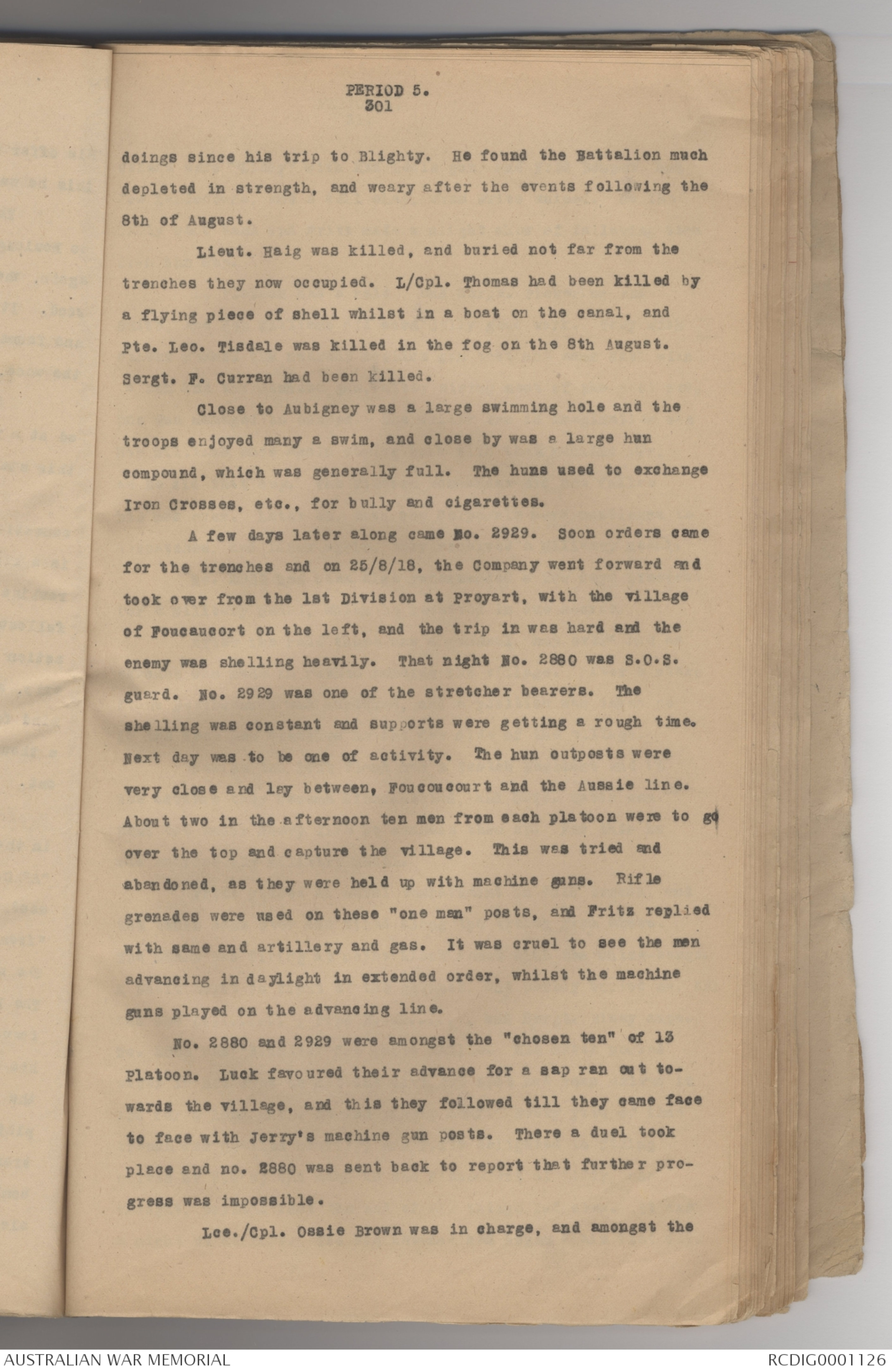
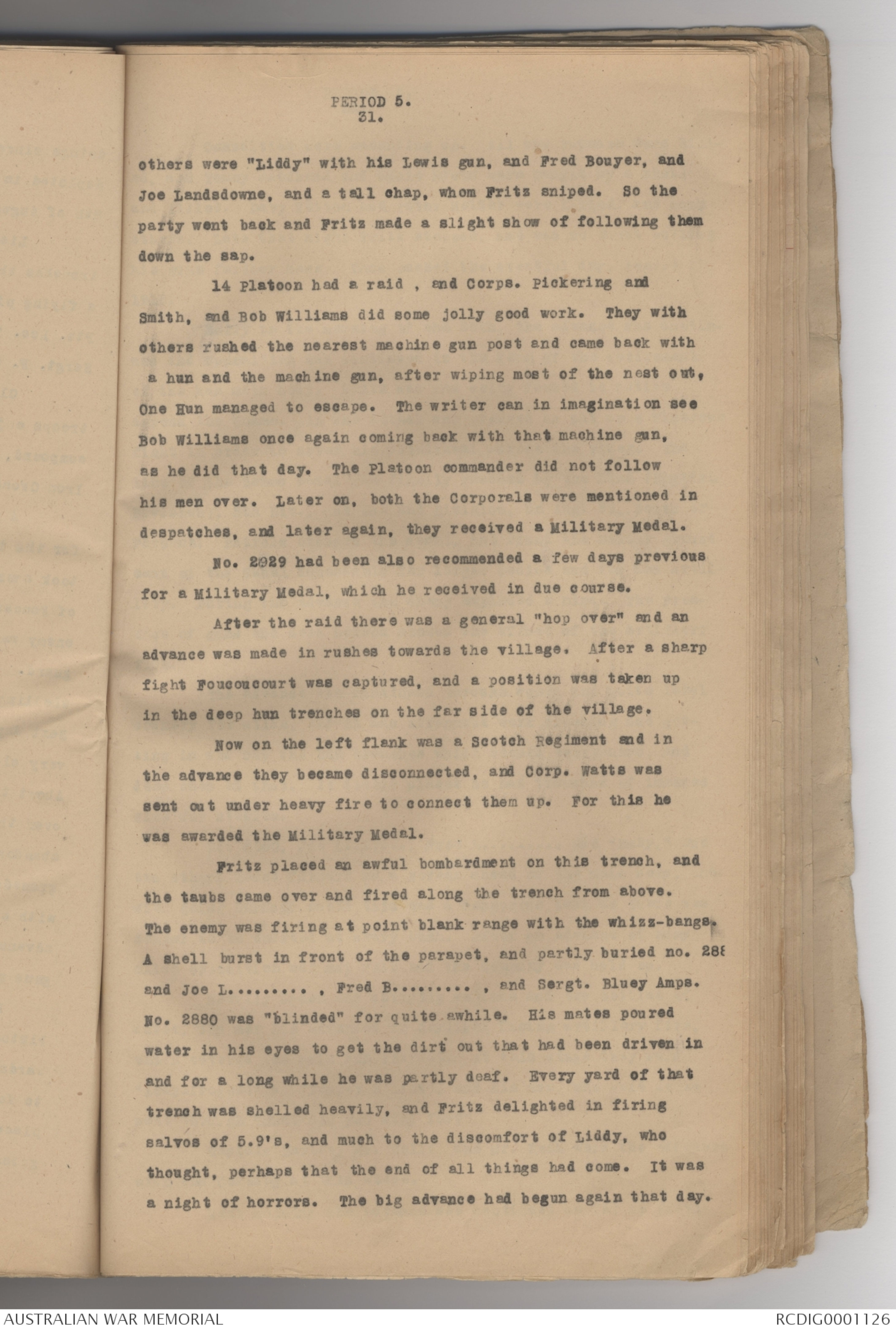
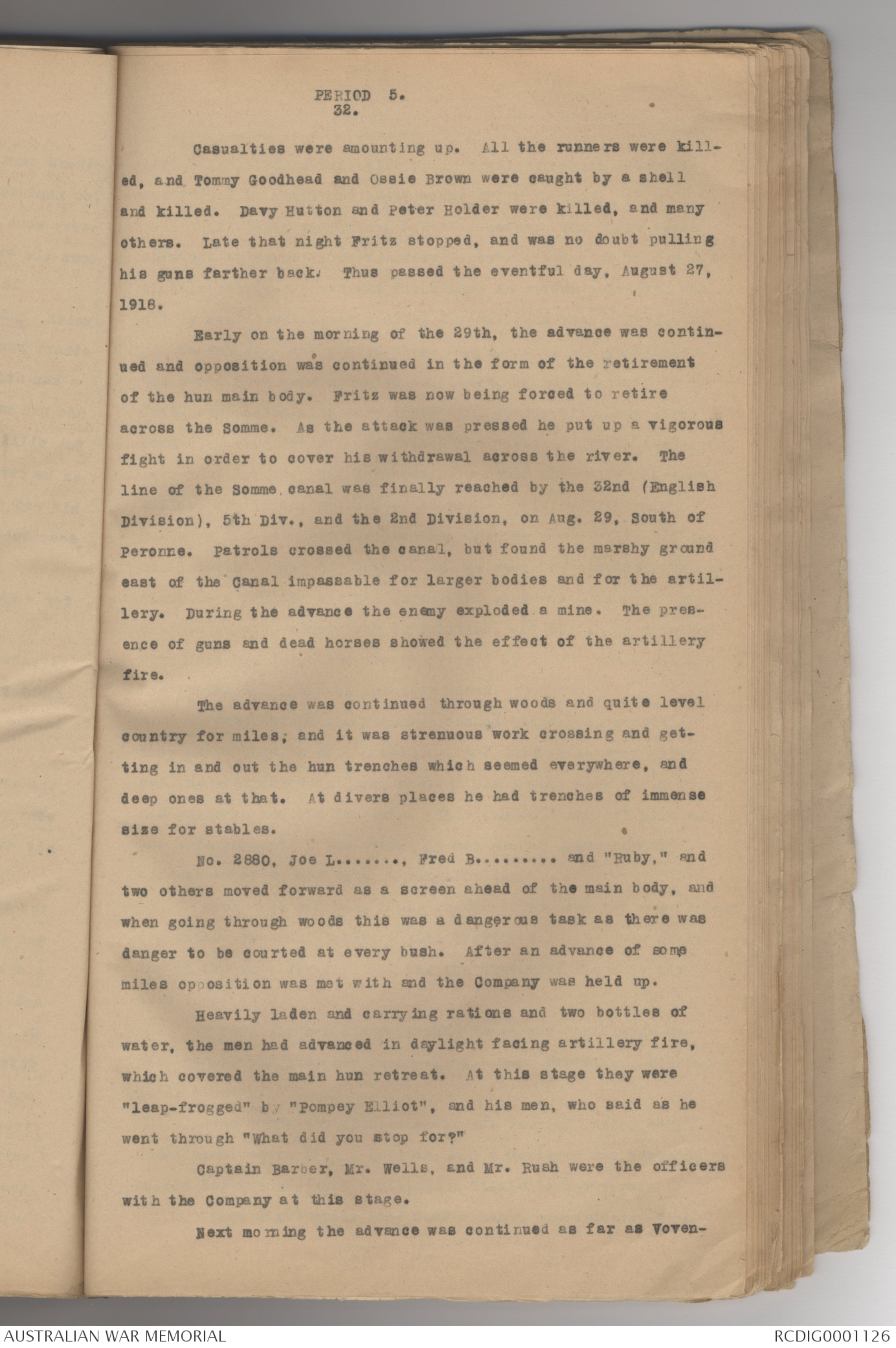
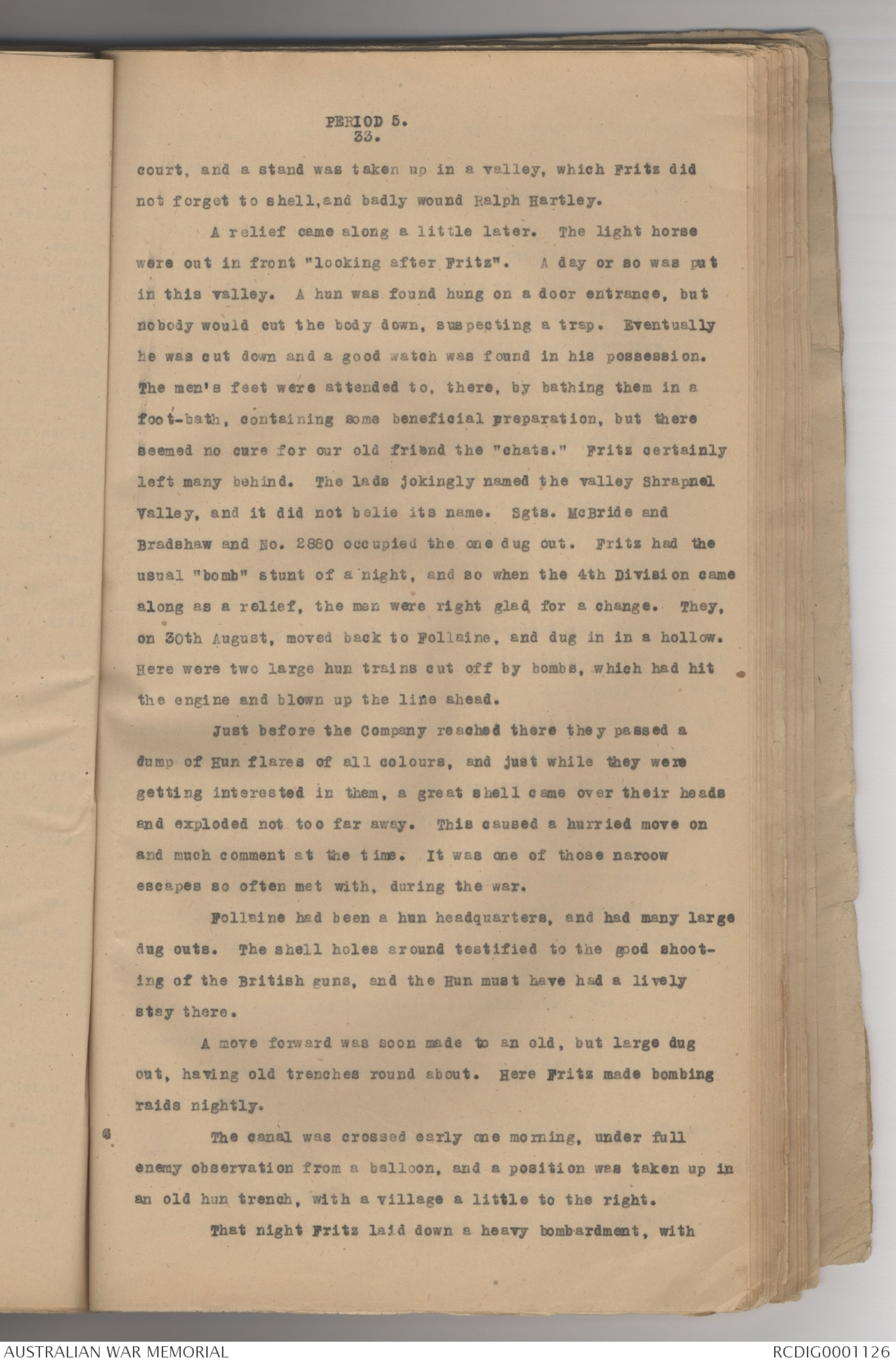
PERIOD 5.
24.
Charing Cross station was reached and very soon they were
at Dartford, and No. 2880 found himself once again on furlough
in the great City, of London.
In a letter written from "Peel House," Regency Street,
Westminster, 24/6/18, he says:-
"A few more days and I shall be soldiering again.
Am at present enjoying myself immensely on furlough. Have been
to Gloucester, where I saw the famous New Inn, and stood near
the Cathedral and on the spot where the Bishops were burnt at
the stake, so long ago. A monument marks that spot now. I
found that I would hardly have time to go to Scotland. Aussies
are magnificently treated all over England. Everything is made
so convenient for us.
Thanks to the Y.M.C.A. who have offices all over London,
we are able to practically go anywhere, and very often free,
and without any trouble. We have our clubs, etc., and so we
are made quite at home.
In those clubs, are to be found many titled ladies performing
duties as waitresses, and some of the Diggers had no
idea who the waitress was at times. These ladies gave their
services voluntarily.
Now at intervals from 1916 to 1918, No. 2880 had during
each trip to Blighty, noticed that the same "waitress" was
always present at his table, and so out of curiosity he once
asked the hall porter who she was. "Oh," said he, "that's the
Honorable Mrs. M., she owns this place and subsidises it
with a great sum yearly."
The munition girls are doing a great work too. Then we
have our Nurses. There is only one word to describe them--
"Angels." I have seen these women engaged in their work over
in France doing their work, whilst the hun shells were dropping
around. In the recent enemy offensive, the Huns advanced
rapidly and the advanced hospitals were in great danger. In
one case all the stretcher cases were taken out and the patient
PERIOD 5 25.
hurried away, and the walking cases were ready to move just as
the Hun was entering the village. Yet in spite of the Hun gas
and shells, the whole staff and walking patients left the hospital,
and walking under the cover of night, got clear away.
Can you imagine it all. Those gallant nurses walked nearly
thirty miles to safety. Of such are our British women. It
has been reported that a party of British prisoners once asked
for a drink of water and in mockery the Hun sisters poured
water on the ground before their eyes. No British woman could
do that.
Fritz made a dastardly attack on the base hospital
at Etaples about April, 1918. It happened on a Sunday night.
The machines dropped bombs, and flew low enough to sweep
the wards with machine guns. The loss of life amounted into
some hundreds. The whole staff remained on duty, during the
raid. One plane was shot down and the hun officer was placed
in the shattered hospital. He at once demanded to be taken to
England. The doctor then informed him that he would be the
last man to leave. The Hun admitted that the Germans were
well aware that it was a hospital they were attacking. Fritz
often had his large aerodromes protected with the Red Cross
sign.
Extract from a letter written from Sandhill Camp. O.T.B.
England. August 10th, 1918.
"A Rum jar is fired from a Trench Mortar and is a huge shell,
which bursts with deadly effect and gives off a dense black
smoke. A Minny (Minnin werfer) is also a trench Mortar
(Toch Emma). It can be seen coming in the air by day, and at
night its progress can be traced by following the thin red
streak of fire. It is really a portable mine. The explosion
is terrific. I am pleased to say that I am pretty right again,
and am going out to France in two days time. I wish it were
all over, as this life is awful. Some day I will give you the
"Dinkum Oil"– not now. No, I never received the tin of biscuits,
that they took out at the Comforts Fund. Hard luck,
wasn't it.
PERIOD 5.
26.
Some Digger has got a "buckshee." parcel, somewhere. No
equal to Aussie "weed" have I found in England. I took some
packets of tobacco off a hun, but after smoking two pipes full
I dumped it. It was about the limit. In the hun army today,
they get tobacco substitue.
I went to the Y.M.C.A. pictures, lately. The boys term
them the "Stiff's Opera," because it is a free show, and they
are "stiff" because they have no money.
We are a mixed crowd here, and when the Melbourne scenes
came on first the N.S.W. portion of the house, yelled out as
in one voice. "What about 'Our 'Arbour'?" And when the Yarra
came on, they called out "Take it off, it smells." Then to our
delight on came Sydney Heads, and the harbour. Gee! The roof
came nearly off with cheers that quite drowned all opposition.
We saw Coogee, Mosman, and Circular Quay. The next scene was
marked "Sydney the Summer resort of Melbourne! Things are dead
funny over here with the Diggers. When there is an Australian
about, no other troops in the world have a chance. The Digger
gets in for "his cut" all right. They seem to get the best of
everything. Its just the same in Paris. The yarns our fellows
tell these English girls are astounding, but now after three
years the girls are waking up, and it is hard to pitch a tale
now. One of the English newspapers termed the Australians as
"Australiars." Every Aussie had a farm or a gold mine. One
fellow had a farm at Coogee, and a gold mine at St. Kilda.
It is said that King George has offered to erect a magnificent
monument to the first Aussie he meets who does not own a farm.
To wear a slouch hat is a sure passport for a good
time. You have no idea how these English folks look upon us.
You see we are so different from Tommy, we have a freer life and
we taught him many things, which he did not "compree" till we
came. Another thing is that when he gets leave, he is able to
see his home and his people, which is denied to us. So the
people threw open their doors to us heart ily
I remember one dark night when we were ploughing our
way to the line at Messines through the mud and blown up duckboards
PERIOD 5.
27.
to relieve the Tommies at Messines, that a couple of
their officers were waiting for us, just behind the lines.
Suddenly some of our fellows rolled into a shell hole, full
of water and the air was blue for quite a while.
In the darkness we heard those officers, say, "It's
all right, here comes the Australians. Hark at them!"
Apparently there was no need of introduction.
The Yanks are like us, good fellows, full of dash and
pluck, but greatly given to "brag". But I hate to write about
the War. I think I am one of the fed up ones, but should I
live to be an old men, I shall never forget the boys who paid the
supreme sacrifice, and how they died. Especially mates of mine.
Some of them were laid low right by my side, and yet I have
escaped so far. Many and many a night I thought that I was sent
for. Yes, poor old "Yank" has gone to his last resting place.
I was not far from him the morning that the cruel shell did its
deadly work. He was a good fellow and all the boys loved him.
He was my officer at Liverpool, and came away on the "Nestor" ss
a second lieutenant. He died as a Captain. Had he been spared
there seemed no doubt that promotion stared him in the face."
Extract from a letter written from the Y.M.C.A. Hut
Sandhill, 13/8/18.
"This is my last day in Blighty –-dear old Blighty–the
wounded soldiers paradise, and our second home. Today has been
perfect, and yet as the day is waning, I write this in the good
old "Y.M.C.A. Hut," and my thoughts fly right across the mighty
expanse of water to all at home.
Tomorrow I embark for France, and am for the third time,
"Hopping in for my cut," over there. So before leaving England,
I am on the eve of my departure, writing to say that all is well
with me, and thanks to a splendid medical service I am strong
again.
At present the line is all aflame across the Channel,
and the Huns are getting their deserts now. As far as I know I
am going up to the Amiens Sector. The Battalion has been in the
WARMINSTER
PERIOD 5.
28.
line since January. The poor chaps must be completely done out.
I have been one of the lucky ones to be over here, whilst the
heaviest fighting of the year has been taking place. I am very
thankful for being "so lucky." Tomorrow night, as soon as the
darkness is on the Channel, we cross over. My wound has put me
out of action for four months, but the rest has done my a power
of good. Soon I shall be in it all again and I trust that I
shall come through it safely. Mail is uncertain now,
as some of the boats are being sunk."
Sandhill Camp lay close to Warminster and Longbridge
Deverill, and was on O.T.B. But it had not the interesting
surroundings that the previous convalescent camp at No. 4
Command Depot, Hurdcott, had. For from there one could very
easily go to Salisbury, and that pretty walk to Wilton was quite
a favourite. At Wilton was the Earl of Pembroke's Castle and
Estates.
At Hurdcotte, the camp lay at the foot of a large Rising
Sun, were done in chalk, and were really works of credit.
It is said that the owner of the ground showed his "appreciation
by putting in a claim for damage done. Not far from Wilton was
a village, and the present inhabitants of that place will show
a visitor a stable in which they claim that Dick Turpin stabbed
his famous mare Black Bess.
Sutton Veney lay close to Sandhill, and those who have
been there must well remember that large white house occupied
by the Y.M.C.A., and those ladies who played the piano so well.
Very soon No. 2880 was on draft for France, but before
departing he managed to get a couple of days leave in Bristol.
In the same draft was Mr. RUSH, an officer, who was
rather popular. When he first joined up the Battalion in
France he was noticeably windy and was quite a dug-out King,
but after a while he proved himself as game as the "next man."
On one occasion at Messines he volunteered to have the
mules taken with the hot food, up to the forward area, though
an order was out against this, as the roads were being heavily
shelled.
PERIOD 5.
29.
His offer was accepted and the expedition returned safe. For
this he was awarded the Military Cross.
The draft left Folkstone and crossed over the Channel
to Boulougne, and after a train journey in those trucks once
again, the men stayed for a couple of days in dug-outs in a
wood. It was there that the fact that the "nips had got in
and fanned him of his tunic and sundries. "Old Shep" was in
the wood, too.
After a while the men entrained once again, and detrained
at a village where the "wing of the 5th Division was. At
this stage they were fast approaching the firing line.
Only those who have experienced it can possibly know the
sensation of going back to France after a Blighty leave. It
is a kind of sinking feeling that grips a man which makes him
realise the seriousness of his venture, and he realises to the
fullest measure the risks he is about to take. But once in
action that feeling vanished. It was the thoughts of such a
trip, and not actually the trip itself, and once on the way the
mind found plenty of food to "get busy on", and all thought of
a thousand dangers was forgotten in the excitement of the moment.
No. 2880 moved ahead of his mate, leaving him behind
in the wood. On this occasion his companion was Pte. Morris of
"A" Coy., known as the Bully Beef King. Incidentally he often
used to "trade" the latter article down at "Madams" for an "one"
"franc", or two, and generally collected all the beef he could.
The men detrained at Douai, and marched to Aubigney near Corbie.
The Battalion came out of the line the same night, and No. 2880
found himself amongst his Battalion again, but sad to relate
his old platoon was gone for ever. It had been split up and
the other platoons got the benefit. So he was attached to 13
platoon, and became acquainted with Sergt. Bradshaw. The
trenches were dug out of chalk. The Hun made trouble of a night
bomb dropping. The portion of the trench occupied by No. 2880,
also held Joe L. and Fred B.
So with no little eagerness he was
PERIOD 5.
301.
doings since his trip to Blighty. He found the Battalion much
depleted in strength, and weary after the events following the
8th of August.
Lieut. Haig was killed, and buried not far from the
trenches they now occupied. L/Cpl. Thomas had been killed by
a flying piece of shell whilst in a boat on the canal, and
Pte. Leo. Tisdale was killed in the fog on the 8th August.
Sergt. F. Curran had been killed.
Close to Aubigney was a large swimming hole and the
troops enjoyed many a swim, and close by was a large hun
compound, which was generally full. The huns used to exchange
Iron Crosses, etc., for bully and cigarettes.
A few days later along came no. 2929. Soon orders came
for the trenches and on 25/8/18, the Company went forward and
took over from the 1st Division at Proyart, with the village
of Foucaucort on the left, and the trip in was hard and the
enemy was shelling heavily. That night No. 2880 was S.O.S.
guard. No. 2929 was one of the stretcher bearers. The
shelling was constant and supports were getting a rough time.
Next day was to be one of activity. The hun outposts were
very close and lay between, Foucoucourt and the Aussie line.
About two in the afternoon ten men from each platoon were to go
over the top and capture the village. This was tried and
abandoned, as they were held up with machine guns. Rifle
grenades were used on these "one man" posts, and Fritz replied
with same and artillery and gas. It was cruel to see the men
advancing in daylight in extended order, whilst the machine
guns played on the advancing line.
No. 2880 and 2929 were amongst the "chosen ten" of 13
Platoon. Luck favoured their advance for a sap ran out towards
the village, and this they followed till they came face
to face with Jerry's machine gun posts. There a duel took
place and no. 2880 was sent back to report that further progress
was impossible.
Lce./Cpl. Ossie Brown was in charge, and amongst the
PERIOD 5.
31.
others were "Liddy" with his Lewis gun, and Fred Bouyer, and
Joe Landsdowne, and a tall chap, whom Fritz sniped. So the
party went back and Fritz made a slight show of following them
down the sap.
14 Platoon had a raid, and Corps. Pickering and
Smith, and Bob Williams did some jolly good work. They with
others rushed the nearest machine gun post and came back with
a hun and the machine gun, after wiping most of the nest out,
One Hun managed to escape. The writer can in imagination see
Bob Williams once again coming back with that machine gun,
as he did that day. The Platoon commander did not follow
his men over. Later on, both the Corporals were mentioned in
despatches, and later again, they received a Military Medal.
No. 2929 had been also recommended a few days previous
for a Military Medal, which he received in due course.
After the raid there was a general "hop over" and an
advance was made in rushes towards the village. After a sharp
fight Foucoucourt was captured, and a position was taken up
in the deep hun trenches on the far side of the village.
Now on the left flank was a Scotch Regiment and in
the advance they became disconnected, and Corp. Watts was
sent out under heavy fire to connect them up. For this he
was awarded the Military Medal.
Fritz placed an awful bombardment on this trench, and
the taubs came over and fired along the trench from above.
The enemy was firing at point blank range with the whizz-bangs.
A shell burst in front of the parapet, and partly buried no. 288
and Joe L. , Fred B. , and Sergt. Bluey Amps.
No. 2880 was "blinded" for quite awhile. His mates poured
water in his eyes to get the dirt out that had been driven in
and for a long while he was partly deaf. Every yard of that
trench was shelled heavily, and Fritz delighted in firing
salvos of 5.9's, and much to the discomfort of Liddy, who
thought, perhaps that the end of all things had come. It was
a night of horrors. The big advance had begun again that day.
PERIOD 5.
32.
Casualties were amounting up. All the runners were killed,
and Tommy Goodhead and Ossie Brown were caught by a shell
and killed. Davy Hutton and Peter Holder were killed, and many
others. Late that night Fritz stopped, and was no doubt pulling
his guns farther back. Thus passed the eventful day, August 27,
1918.
Early on the morning of the 29th, the advance was continued
and opposition was continued in the form of the retirement
of the hun main body. Fritz was now being forced to retire
across the Somme. As the attack was pressed he put up a vigorous
fight in order to cover his withdrawal across the river. The
line of the Somme canal was finally reached by the 32nd (English
Division), 5th Div., and the 2nd Division, on Aug. 29. South of
Peronne. Patrols crossed the canal, but found the marshy ground
east of the Canal impassable for larger bodies and for the artillery.
During the advance the enemy exploded a mine. The presence
of guns and dead horses showed the effect of the artillery
fire.
The advance was continued through woods and quite level
country for miles; and it was strenuous work crossing and getting
in and out the hun trenches which seemed everywhere, and
deep ones at that. At divers places he had trenches of immense
size for stables.
No. 2880, Joe L, Fred B and "Ruby," and
two others moved forward as a screen ahead of the main body, and
when going through woods this was a dangerous task as there was
danger to be courted at every bush. After an advance of some
miles opposition was met with and the Company was held up.
Heavily laden and carrying rations and two bottles of
water, the men had advanced in daylight facing artillery fire,
which covered the main hun retreat. At this stage they were
"leap-frogged" by "Pompey Elliot", and his men, who said as he
went through "What did you stop for?"
Captain Barber, Mr. Wells, and Mr. Rush were the officers
with the Company at this stage.
Next morning the advance was continued as far as Vovencourt,
PERIOD 5.
33.
and a stand was taken up in a valley, which Fritz did
not forget to shell, and badly wound Ralph Hartley.
A relief came along a little later. The light horse
were out in front "looking after Fritz". A day or so was put
in this valley. A hun was found hung on a door entrance, but
nobody would cut the body down, suspecting a trap. Eventually
he was cut down and a good watch was found in his possession.
The men's feet were attended to, there, by bathing them in a
foot-bath, containing some beneficial preparation, but there
seemed no cure for our old friend the "chats." Fritz certainly
left many behind. The lads jokingly named the valley Shrapnel
Valley, and it did not belie its name. Sgts. McBride and
Bradshaw and No. 2880 occupied the one dug out. Fritz had the
usual "bomb" stunt of a night, and so when the 4th Division came
along as a relief, the men were right glad for a change. They,
on 30th August, moved back to Follaine, and dug in in a hollow.
Here were two large hun trains cut off by bombs, which had hit
the engine and blown up the line ahead.
Just before the Company reached there they passed a
dump of Hun flares of all colours, and just while they were
getting interested in them, a great shell came over their heads
and exploded not too far away. This caused a hurried move on
and much comment at the time. It was one of those naroow
escapes so often met with, during the war.
Follaine had been a hun headquarters, and had many large
dug outs. The shell holes around testified to the good shooting
of the British guns, and the Hun must have had a lively
stay there.
A move forward was soon made to an old, but large dug
out, having old trenches round about. Here Fritz made bombing
raids nightly.
The canal was crossed early one morning, under full
enemy observation from a balloon, and a position was taken up in
an old hun trench, with a village a little to the right.
That night Fritz laid down a heavy bombardment, with
 Marj Moodie
Marj MoodieThis transcription item is now locked to you for editing. To release the lock either Save your changes or Cancel.
This lock will be automatically released after 60 minutes of inactivity.